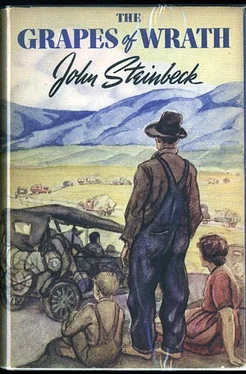John Steinbeck - The Grapes of Wrath
Здесь есть возможность читать онлайн «John Steinbeck - The Grapes of Wrath» весь текст электронной книги совершенно бесплатно (целиком полную версию без сокращений). В некоторых случаях можно слушать аудио, скачать через торрент в формате fb2 и присутствует краткое содержание. Город: New York, Год выпуска: 1939, Издательство: The Viking Press-James Lloyd, Жанр: Классическая проза, на английском языке. Описание произведения, (предисловие) а так же отзывы посетителей доступны на портале библиотеки ЛибКат.
- Название:The Grapes of Wrath
- Автор:
- Издательство:The Viking Press-James Lloyd
- Жанр:
- Год:1939
- Город:New York
- ISBN:нет данных
- Рейтинг книги:5 / 5. Голосов: 1
-
Избранное:Добавить в избранное
- Отзывы:
-
Ваша оценка:
- 100
- 1
- 2
- 3
- 4
- 5
The Grapes of Wrath: краткое содержание, описание и аннотация
Предлагаем к чтению аннотацию, описание, краткое содержание или предисловие (зависит от того, что написал сам автор книги «The Grapes of Wrath»). Если вы не нашли необходимую информацию о книге — напишите в комментариях, мы постараемся отыскать её.
The Grapes of Wrath — читать онлайн бесплатно полную книгу (весь текст) целиком
Ниже представлен текст книги, разбитый по страницам. Система сохранения места последней прочитанной страницы, позволяет с удобством читать онлайн бесплатно книгу «The Grapes of Wrath», без необходимости каждый раз заново искать на чём Вы остановились. Поставьте закладку, и сможете в любой момент перейти на страницу, на которой закончили чтение.
Интервал:
Закладка:
“Wonder if the roof leaks.”
“No, I don’ think so. Be nice an’ dry, but we got to have wood. Got to keep warm. Take Ruthie an’ Winfiel’ too. They can get twigs. This here girl ain’t well.” Ma got out, and Rose of Sharon tried to follow, but her knees buckled and she sat down heavily on the running board.
Fat Mrs. Wainwright saw her. “What’s a matter? Her time come?”
“No, I don’ think so,” said Ma. “Got a chill. Maybe took col’. Gimme a han’, will you?” The two women supported Rose of Sharon. After a few steps her strength came back—her legs took her weight.
“I’m awright, Ma,” she said. “It was jus’ a minute there.” The older women kept hands on her elbows. “Feet in hot water,” Ma said wisely. They helped her up the cat-walk and into the boxcar.
“You rub her,” Mrs. Wainwright said. “I’ll get a far’ goin’.” She used the last of the twigs and built up a blaze in the stove. The rain poured now, scoured at the roof of the car.
Ma looked up at it. “Thank God we got a tight roof,” she said. “Them tents leaks, no matter how good. Jus’ put on a little water, Mis’ Wainwright.”
Rose of Sharon lay still on a mattress. She let them take off her shoes and rub her feet. Mrs. Wainwright bent over her. “You got pain?” she demanded.
“No. Jus’ don’ feel good. Jus’ feel bad.”
“I got pain killer an’ salts,” Mrs. Wainwright said. “You’re welcome to ’em if you want ’em. Perfec’ly welcome.”
The girl shivered violently. “Cover me up, Ma. I’m col’.” Ma brought all the blankets and piled them on top of her. The rain roared down on the roof.
Now the wood-gatherers returned, their arms piled high with sticks and their hats and coats dripping. “Jesus, she’s wet,” Pa said. “Soaks you in a minute.”
Ma said, “Better go back an’ get more. Burns up awful quick. Be dark purty soon.” Ruthie and Winfield dripped in and threw their sticks on the pile. They turned to go again. “You stay,” Ma ordered. “Stan’ up close to the fire an’ get dry.”
The afternoon was silver with rain, the roads glittered with water. Hour by hour the cotton plants seemed to blacken and shrivel. Pa and Al and Uncle John made trip after trip into the thickets and brought back loads of dead wood. They piled it near the door, until the heap of it nearly reached the ceiling, and at last they stopped and walked toward the stove. Streams of water ran from their hats to their shoulders. The edges of their coats dripped and their shoes squished as they walked.
“Awright, now, get off them clothes,” Ma said. “I got some nice coffee for you fellas. An’ you got dry overhalls to put on. Don’ stan’ there.”
The evening came early. In the boxcars the families huddled together, listening to the pouring water on the roofs.
CHAPTER 29
OVER THE HIGH COAST mountains and over the valleys the gray clouds marched in from the ocean. The wind blew fiercely and silently, high in the air, and it swished in the brush, and it roared in the forests. The clouds came in brokenly, in puffs, in folds, in gray crags; and they piled in together and settled low over the west. And then the wind stopped and left the clouds deep and solid. The rain began with gusty showers, pauses and downpours; and then gradually it settled to a single tempo, small drops and a steady beat, rain that was gray to see through, rain that cut midday light to evening. And at first the dry earth sucked the moisture down and blackened. For two days the earth drank the rain, until the earth was full. Then puddles formed, and in the low places little lakes formed in the fields. The muddy lakes rose higher, and the steady rain whipped the shining water. At last the mountains were full, and the hillsides spilled into the streams, built them to freshets, and sent them roaring down the canyons into the valleys. The rain beat on steadily. And the streams and the little rivers edged up to the bank sides and worked at willows and tree roots, bent the willows deep in the current, cut out the roots of cottonwoods and brought down the trees. The muddy water whirled along the bank sides and crept up the banks until at last it spilled over, into the fields, into the orchards, into the cotton patches where the black stems stood. Level fields became lakes, broad and gray, and the rain whipped up the surfaces. Then the water poured over the highways, and cars moved slowly, cutting the water ahead, and leaving a boiling muddy wake behind. The earth whispered under the beat of the rain, and the streams thundered under the churning freshets.
When the first rain started, the migrant people huddled in their tents, saying, It’ll soon be over, and asking, How long’s it likely to go on?
And when the puddles formed, the men went out in the rain with shovels and built little dikes around the tents. The beating rain worked at the canvas until it penetrated and sent streams down. And then the little dikes washed out and the water came inside, and the streams wet the beds and the blankets. The people sat in wet clothes. They set up boxes and put planks on the boxes. Then, day and night, they sat on the planks.
Beside the tents the old cars stood, and water fouled the ignition wires and water fouled the carburetors. The little gray tents stood in lakes. And at last the people had to move. Then the cars wouldn’t start because the wires were shorted; and if the engines would run, deep mud engulfed the wheels. And the people waded away, carrying their wet blankets in their arms. They splashed along, carrying the children, carrying the very old, in their arms. And if a barn stood on high ground, it was filled with people, shivering and hopeless.
Then some went to the relief offices, and they came sadly back to their own people.
They’s rules—you got to be here a year before you can git relief. They say the gov’ment is gonna help. They don’ know when.
And gradually the greatest terror of all came along.
They ain’t gonna be no kinda work for three months.
In the barns, the people sat huddled together; and the terror came over them, and their faces were gray with terror. The children cried with hunger, and there was no food.
Then the sickness came, pneumonia, and measles that went to the eyes and to the mastoids.
And the rain fell steadily, and the water flowed over the highways, for the culverts could not carry the water.
Then from the tents, from the crowded barns, groups of sodden men went out, their clothes slopping rags, their shoes muddy pulp. They splashed out through the water, to the towns, to the country stores, to the relief offices, to beg for food, to cringe and beg for food, to beg for relief, to try to steal, to lie. And under the begging, and under the cringing, a hopeless anger began to smolder. And in the little towns pity for the sodden men changed to anger, and anger at the hungry people changed to fear of them. Then sheriffs swore in deputies in droves, and orders were rushed for rifles, for tear gas, for ammunition. Then the hungry men crowded the alleys behind the stores to beg for bread, to beg for rotting vegetables, to steal when they could.
Frantic men pounded on the doors of the doctors; and the doctors were busy. And sad men left word at country stores for the coroner to send a car. The coroners were not too busy. The coroners’ wagons backed up through the mud and took out the dead.
And the rain pattered relentlessly down, and the streams broke their banks and spread out over the country.
Huddled under sheds, lying in wet hay, the hunger and the fear bred anger. Then boys went out, not to beg, but to steal; and men went out weakly, to try to steal.
The sheriffs swore in new deputies and ordered new rifles; and the comfortable people in tight houses felt pity at first and then distaste, and finally hatred for the migrant people.
Читать дальшеИнтервал:
Закладка:
Похожие книги на «The Grapes of Wrath»
Представляем Вашему вниманию похожие книги на «The Grapes of Wrath» списком для выбора. Мы отобрали схожую по названию и смыслу литературу в надежде предоставить читателям больше вариантов отыскать новые, интересные, ещё непрочитанные произведения.
Обсуждение, отзывы о книге «The Grapes of Wrath» и просто собственные мнения читателей. Оставьте ваши комментарии, напишите, что Вы думаете о произведении, его смысле или главных героях. Укажите что конкретно понравилось, а что нет, и почему Вы так считаете.











